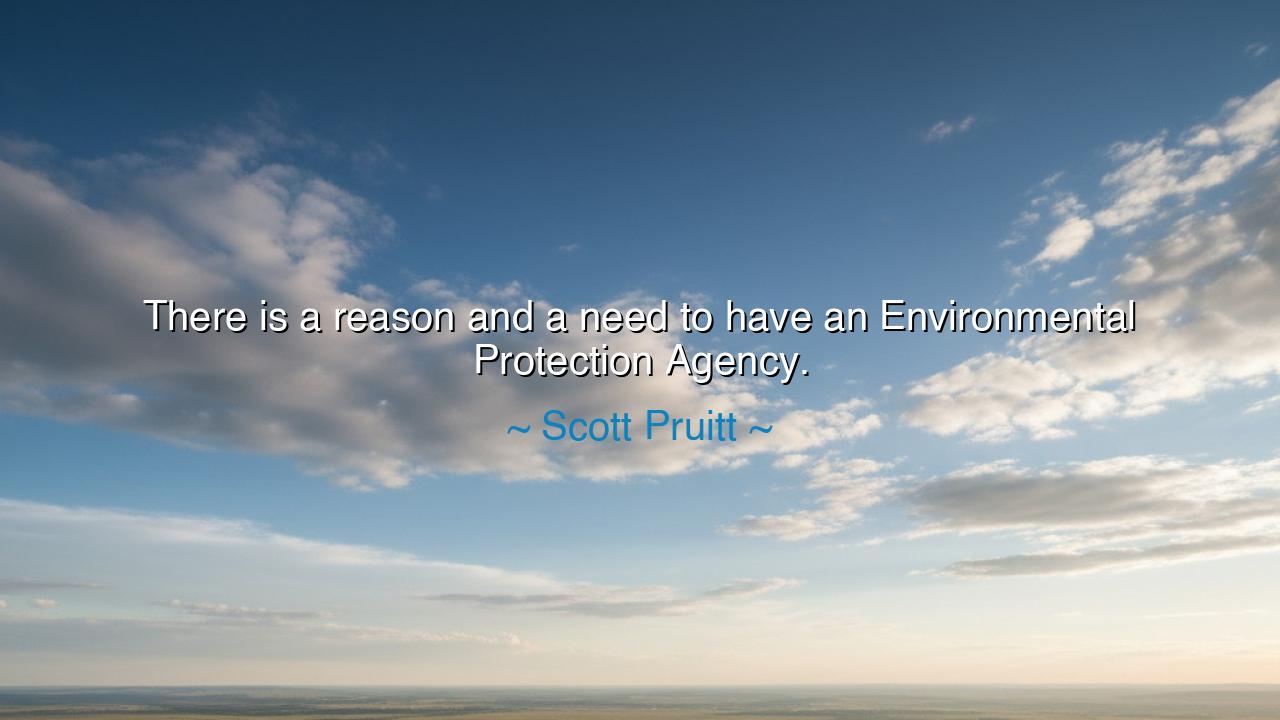
There is a reason and a need to have an Environmental Protection






Hear the words of Scott Pruitt, simple yet grave, spoken as both acknowledgment and warning: “There is a reason and a need to have an Environmental Protection Agency.” These words are more than a bureaucrat’s justification—they are the recognition of a truth carved in the very soil, air, and water of a nation. For the earth, though vast, is not invincible, and man, though clever, can be reckless. It was not theory but bitter experience that gave birth to the EPA, and Pruitt, though often a critic of its reach, could not deny the necessity of its existence.
The meaning of this quote lies in the fragile covenant between humanity and the natural world. When Pruitt speaks of reason and need, he calls to mind the disasters of the past—when rivers caught fire with chemical waste, when cities were shrouded in choking smog, when children drank poisoned water and the land itself groaned beneath the weight of pollution. It was in response to such calamities that the EPA was formed in 1970: a guardian set to watch over the common goods of air, water, and land, things that no single person or state could protect alone.
The origin of these words is bound to that moment in history when Americans awakened to the truth that the environment was not infinite. The burning of the Cuyahoga River in 1969, blackened and aflame with oil and debris, became a symbol of neglect. Rachel Carson’s Silent Spring had already warned of poisons spreading through field and stream. The people rose in protest, and leaders responded, birthing the Environmental Protection Agency to guard against humanity’s own folly. Pruitt’s statement is a recognition of that lineage: the agency exists because human nature, unrestrained, too often wounds the world it inhabits.
History offers us parallels beyond America. The ancient Sumerians irrigated their lands until salt poisoned their fields, leading to the decline of their civilization. In contrast, the people of ancient Japan learned to manage forests with care, practicing controlled harvest and replanting, preserving their resources for centuries. One path led to collapse, the other to endurance. The EPA, at its heart, was meant to guide America along the second path—to prevent short-sighted greed from bringing long-term ruin.
The lesson is profound: oversight and stewardship are not chains upon freedom, but safeguards for survival. Left unchecked, industry and ambition will often exploit until nothing remains. The EPA stands as a reminder that the earth’s resources belong not only to the present, but also to the unborn. It exists so that rivers will remain drinkable, skies breathable, and soils fertile. It is not a symbol of prohibition, but of protection, ensuring that prosperity does not consume the very ground upon which it stands.
What then must we do? As citizens, we must support the reason for such institutions, even as we call for their accountability and wisdom. We must demand that they serve the people, not merely their own power, and that they act as guardians, not tyrants. In our own lives, we must live as though we too are part of the Environmental Protection Agency—protecting streams, conserving energy, planting trees, and reducing waste. For no agency, however strong, can succeed without the participation of those it serves.
Thus, remember Scott Pruitt’s words: “There is a reason and a need to have an Environmental Protection Agency.” Pass this teaching to your children: that institutions exist because memory fades, and the lessons of the past must be enshrined to guard the future. Let them know that vigilance is eternal, and that the true strength of a people is not only in what they build, but in what they preserve. For in the protection of the earth lies the protection of civilization itself.






AAdministratorAdministrator
Welcome, honored guests. Please leave a comment, we will respond soon